Scott Z. Burns’ The Library is heavy. I guess it would be silly to suggest that any story about a school shooting and its aftermath could be anything but heavy. Different Stages’ current production of The Library (directed by Carl Gonzales and Lacey Cannon Gonzales) is heavy – but not oppressively so. Some hard topics and hard roles are easy to overshoot, and become melodramas. But this cast is authentic and natural.
Lucky Cantu shoulders much of the show’s emotional burden as Caitlin Gabriel, a teenage survivor of a school shooting whose life comes under a different kind of fire when a rumor hits the press that questions her relationship with the shooter. Cantu is so delicate on stage; costumed in comfy leggings and a sweater, surrounded by adults she begs, wide-eyed, to help her, to heal her, to believe her. I only wish she had spoken up a little more; in the third row, she was sometimes difficult to hear.
The rest of the cast are immensely talented. Eva McQuade is intensely emotionally present as Caitlin’s mother and nearly brought me to tears. Liz Waters as Dawn Sheridan gives perhaps the most dynamic performance on stage. We see her immediate confusion and grief, her attempts to reckon with and make peace with her loss and console others somehow, and a new fresh wave of sorrow when the story of her daughter’s last moments of life begin to change. Gina Houston plays two smaller roles, and plays them both with nuance and specificity – enjoyable to watch and a necessary talent in the world of modern playwriting.
Meanwhile, the understated set design (uncredited in the program) works almost magically to support the story. Specifically, laminate-topped school library tables are used as almost everything but school library tables – operating tables, police interview tables, home dining room tables. Along with a closet door that never opens but looms center stage, the tables serve as a constant visual reminder of the event that haunts these characters. Screens on either side of the stage (designed by Lowell Bartholomee) add a little context when a scene shifts. Screens-on-stage are not my favorite modern theater element (we know it’s a police interview room, because there is a policewoman interviewing someone), but they work.
I wish the program for The Library featured a directors’ note. It’s not that this play is hard to understand, or that I think producers of hard art have to hand-hold their audience. But The Library is ten years old. It was written after Columbine and Sandy Hook, but before Parkland or Uvalde. It isn’t dated, exactly, but it’s not of our time. Its 2014 politics are not our 2024 politics (a living John McCain gets a name-check in one scene). Obviously, it would be unreal to expect one off-Broadway play to catalyst a national change that still hasn’t occurred after so many actual school shootings. And yet – what can we expect from it? Who in this blue-bubble Austin audience learned something last night they didn’t know already? Whose mind was changed about gun control? And what Texan who saw the Uvalde shooting unfold still believes that the police report will be the ultimate vindication? A note from the directors wouldn’t have answered all of my overnight questions, of course, but I would have liked to know what their questions were.
Photo: Steve Rogers Photography, Different Stages on Facebook
The Library runs through February 11 at the Trinity Street Playhouse. For information and tickets, visit Different Stages’ website. Remember to bring cash for concessions and donations.


Leave a Reply
You must be logged in to post a comment.